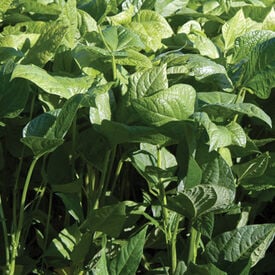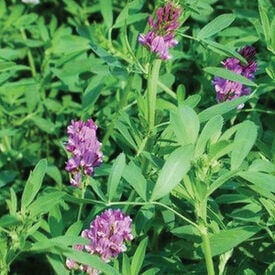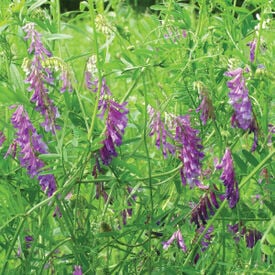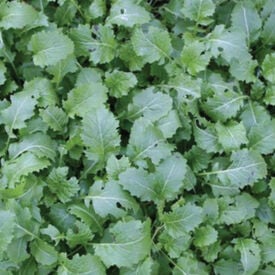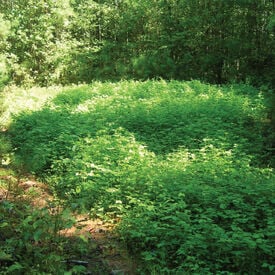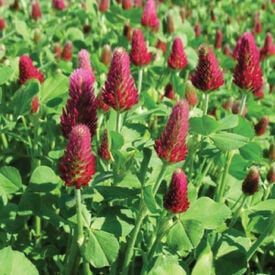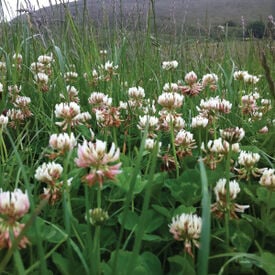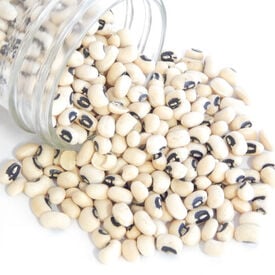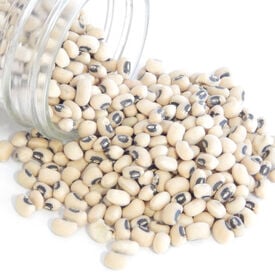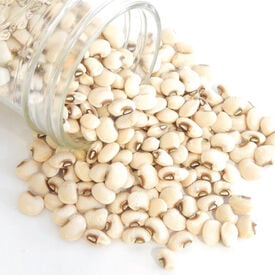Iron and Clay cowpeas makes a great cover crop for smothering weeds and adding Nitrogen to soil. This variety of cowpeas are grown just like soybeans. Iron and Clay is a fast growing plant that can reach 3'. The best time to plant is during spring for best results as the frost will kill the cowpeas. Iron and Clay has long taproots that help withstand drought conditions and can produce as much as 300 lb./acre nitrogen. This variety has a high organic matter production. Broadcast up to 120 lb./acre, 1/2 to 1" deep. Try with cowpea inoculant for maximum Nitrogen fixation.
The Common Alfalfa is a somewhat winter hardy perennial legume, but it grows more quickly than other regular alfalfa varieties. As an annual green manure, this cool-season "Summer" alfalfa can produce up to 10 tons of organic matter per acre. Its long taproots break up compacted soil and bring up subsurface minerals. High nitrogen fixation and great bee forage. Alfalfa is basically good at everything, as it great for nitrogen fixation and bee forage! Just look at all it's uses below! Alfalfa (Medicago sativa L.): Cool season, broadleaf, Perennial, Legume (N-fixation), Upright plant growth, Crude protein: hay or silage 14-22% Uses: Bees & Beneficial Insects, Chicken Forage, Compaction Control, Deer Attractant, Erosion Control, Forage, Green Manure, Nitrogen Fixation, Nitrogen Scavenger, No Till, Organic Matter (Biomass), Weed Suppression
When sown late summer, the Hairy Vetch spring regrowth is vigorous and nitrogen-producing, for tilling in before planting spring garden crops. You can sow with or without grain, grass or field peas! The typical nitrogen produced of this legume is 100 lbs. per acre. The Hairy Vetch has rapid growth that makes it a good weed suppressant. Uses: Bees & Beneficial Insects, Chicken Forage, Deer Attractant, Erosion Control, Forage, Green Manure, Nitrogen Fixation, No Till, Weed Suppression
Dwarf Essex Rape (Brassica napus) is a fast-growing, cold-hardy forage crop commonly used for livestock grazing, wildlife food plots, and soil improvement. This leafy brassica produces high-protein, highly digestible forage that remains palatable even in colder temperatures, making it an excellent choice for fall and winter grazing. It is drought-resistant and can thrive in various soil types, providing a nutritious food source for deer, cattle, and other grazing animals. Additionally, its deep root system helps improve soil structure and reduce erosion. Due to its rapid regrowth, Dwarf Essex Rape is a valuable option for sustainable pasture management.
All of the seeds below are very good at attracting deer to your property! Buckwheat - Improves top soil and an effective choke weed! Plant late spring to early summer. Establishes quickly. Matures in 60 days. Accumulates phosphorus and and potassium for following crops. Frost sensitive. All below packages come in 1lb. bags. Crimson Clover - Winter annual protects and improves soil! Plant fall or early spring. A good nitrogen fixer (70-150 lbs per acre per year). Showy crimson blooms in late spring are an excellent source of nectar for bees. Inter-seeds well with grass. Austrian Winter Pea - A great cool season legume for cover crops, wildlife and winter grazing! Austrian winter pea, sometimes called "black pea" and "field pea" is a cool-season, annual legume with good, nitrogen-fixing capabilities. Austrian winter pea is a low-growing, viny legume which has been shown to fix over 200 pounds of nitrogen per acre per year. Peas - Grow regular old peas in your deer food plot. One of the most preferred vegetables for deer. Oats - Oats will kill off winter weeds and hold soil with a mat of vegetation! A high yielding oat that can produce over 100 bushels per acre. Plant anytime of the year. Deer will graze oats all year round. Barkant Forage Turnip - Great forage crop that provides high energy feed! Barkant turnips are an improved, early maturing, diploid turnip wtih a large purple tankard shaped bulb. Barkant turnips have a high leaf to stem ratio and and provide very high contentrations of protein, sugar content and leaf yields. Barkant Turnips are ideally suited for wildlife. Dwarf Essex Rape - A cabbage related plant that is a perfect grazer! Dwarf Essex Rape is a perfect grazer plant that will persist well after the first frost. Ready to pasture 6-8 weeks after sowing. Hairy Vetch - Sow with or without grain, grass or field peas! When sown late summer, grows fast and will attract wildlife. Hairy Vetch has rapid growth that makes it a good weed suppressant.
The Crimson Clover is an attractive winter annual that can be planted fall or early spring and will protect and improve the soil. This good nitrogen fixer (70-150 lbs per acre per year) blooms showy crimson flowers in late spring that are an excellent source of nectar for bees. This variety inter-seeds well with grass, making it a great way to ready your vegetable garden for the spring or beautify a landscape! Not to be confused with the tough perennial clovers that can take over a meadow. Uses: Bees & Beneficial Insects, Chicken Forage, Compaction Control, Deer Attractant, Erosion Control, Forage, Green Manure, Nitrogen Fixation, No Till, Weed Suppression
The White Dutch Clover is a perennial clover variety that is a customer favorite for controlling erosion while protecting the soil! This legume is a living mulch of permanent cover that spreads by stolons. Grow low so takes close mowing and grazing. The White Dutch Clover benefits bees and insects as well as fixes nitrogen. Uses: Bees & Beneficial Insects, Chicken Forage, Deer Attractant, Erosion Control, Forage, Green Manure, Nitrogen Fixation, No Till, Weed Suppression
Dixie Lee cowpea seeds are a popular variety of cowpeas known for their high yield, disease resistance, and adaptability to various climates. These seeds produce vigorous, heat-tolerant plants that thrive in warm, dry conditions, making them ideal for Southern and drought-prone regions. The Dixie Lee variety is particularly favored for its tender, flavorful beans that are often used in a range of culinary dishes, from soups to side dishes. The plants typically produce medium-sized, cream-colored pods with dark brown or black-eyed beans, and they can be harvested both as fresh beans or dry beans. As a legume, Dixie Lee cowpeas also enrich the soil by fixing nitrogen, benefiting crop rotation systems.
Phenomenal cowpeas are a remarkable variety known for their impressive yield and versatility. These cowpeas produce robust, productive plants that are well-suited to a variety of growing conditions, making them a favorite among gardeners and farmers. Characterized by their large, green pods and high nutritional value, Phenomenal cowpeas offer a rich source of protein, fiber, and essential vitamins. The plants typically reach about 2 to 3 feet in height and can be grown both in garden beds and containers. They are valued for their resilience in hot and dry climates, which makes them particularly well-adapted to regions with challenging weather conditions. With a maturity period of around 70 to 80 days, Phenomenal cowpeas provide a generous harvest of flavorful, tender beans that can be enjoyed fresh, dried, or cooked in a variety of dishes. Their adaptability and high productivity make them a standout choice for both home gardeners and commercial growers.
The California Blackeye #46 is similar to California Blackeye #5, but with smaller seeds. Bred by the UCLA and released in 1987. California Blackeye #46 plants are more erect than California Blackeye #5. The seeds are a typical blackeye type of Southern peas with cream-colored seed coats and black pigments around the eyes. Heavy yielder. If using for Nitrogen fixation we highly recommend using a cowpea inoculant. Try with cowpea inoculant for maximum Nitrogen fixation.
California Blackeye #5 is a high yielding, vigorous and easy to grow. You can use these as green shell peas or dry like winter beans. Pods reach 6-8" long and are loaded with creamy, delicious seeds. Does well in high heat areas. Treated Seed.
The Big Boy Purplehull is a high yielding, popular Southern cowpea that is great for home gardens. Big Boy Purplehull is a long podded variety with 13-16 peas per pod that are light tan in color and oblong shape. This is a good garden variety and is very prolific. If you are using for Nitrogen fixation we highly recommend using a cowpea inoculant. Try with cowpea inoculant for maximum Nitrogen fixation.
